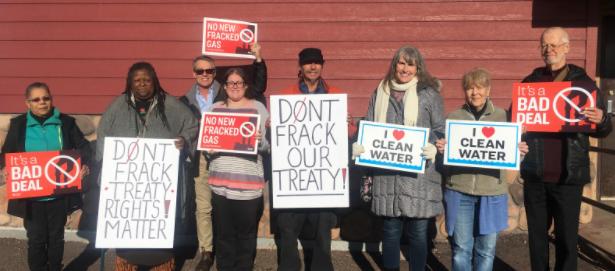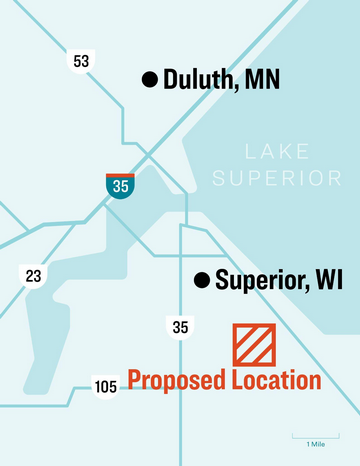
We can’t build new fossil fuel plants in a climate crisis: Minnesota Power & Dairyland must drop plans to build the proposed NTEC gas plant in Superior
By Jessica Tritsch
Summary: Sierra Club and partners continue to oppose the proposed NTEC fossil gas plant that Minnesota Power and Dairyland Power want to build in Superior, WI. We’re fighting NTEC in Minnesota, Wisconsin and through federal advocacy, because we shouldn’t be building a new fossil gas plant in the midst of a climate crisis. There is still time to stop it. Click here to make your voice heard.

Back in 2017, Minnesota Power and Dairyland Power jointly proposed to build a $700 million, 525-625 MW fossil gas combined cycle plant in Superior, WI. The proposed gas plant would be built along 31st Ave E, between Grand Ave and E 10th St, close to people’s homes, schools, and businesses, and only a few miles from Lake Superior. Immediately, Sierra Club joined partners and community members in opposing the plant—which needs approvals in both Wisconsin and Minnesota—because of concerns for our climate, health, environment and the high costs of fossil gas.
Now in 2021, as we struggle with an extreme drought, destructive fires, and unhealthy air quality, building a new fossil fuel power plant is an even riskier proposition for our shared climate. As technology advances and costs continue to decline for clean energy (while fossil gas prices keep going up) this proposed gas plant is even riskier for energy customers.
NTEC is an unnecessary risk for the Northland
-
We don’t need NTEC: Minnesota Power and Dairyland never seriously considered alternatives to fossil fuels when proposing this plant, and they ignored better options like low-cost energy efficiency, renewable energy, and storage. Our analysis found that NTEC was not needed in 2018 (and the Administrative Law Judge overseeing the MN proceeding agreed). Since then, there have been significant advances in energy storage and price declines in clean energy. Yet Minnesota Power did not consider cleaner energy alternatives in its recent plan.
-
It’s really expensive: A 2019 study published by Rocky Mountain Institute looked at 88 proposed gas plants around the country and found that 90% of them, including NTEC, would provide electricity that costs more than if the utilities instead invested in wind, solar and energy efficiency. A November 2019 analysis, conducted by the Sierra Club using the Rocky Mountain Institute's methodology, came to a similar conclusion: this proposal is just too expensive. And the economics are only better for clean energy in 2021.
-
It’s risky for customers: President Biden is calling for 100% clean energy by 2035; Minnesota is considering legislation supported by Governor Walz committing to 100% clean energy by 2040, and Wisconsin Governor Evers’ Task Force on Climate Change recommended that the state avoid all new fossil fuel infrastructure, including gas plants. Fossil gas is not clean energy. NTEC would begin operations in 2025 and customers would be on the hook paying for the gas plant past its useful life.
-
We shouldn’t be building new fossil fuel plants in the midst of a climate crisis. Fossil gas plants are big climate polluters. First, extracting gas (most often through fracking) releases methane into the atmosphere. Methane is a greenhouse gas that traps more heat than carbon dioxide, although it also breaks down more quickly than CO2. Experts agree that methane is 30 to 80 times more potent than carbon dioxide, and that’s not a good thing. Burning fossil gas for power produces greenhouse gases, too. When both carbon and methane emissions are considered, the latest science shows that the build-out of gas infrastructure will prevent us from reducing greenhouse gas emissions enough to avoid the worst impacts of climate change. Sierra Club estimates that NTEC would emit 2.2 million metric tons of CO2 equivalent each year, including “upstream” emissions from extracting and transporting fossil gas and “downstream” emissions from burning gas at the plant.
There’s still time to say no to NTEC
Minnesota Power & Dairyland do not have all the approvals they need to start construction
-
Minnesota Public Utilities Commission Approval
The plant was initially approved by the Minnesota Public Utilities Commission (PUC) in a 3-2 vote in 2018, despite the Administrative Law Judge overseeing the hearing in recommending that the proposal be rejected. Environmental groups, industrial customer groups, student groups, and consumer groups were aligned in opposition to the plant. Sierra Club, MCEA, Honor the Earth, and Union of Concerned Scientists appealed this decision. While we won our appeal at the Minnesota Court of Appeals in December 2020 because the PUC had not considered environmental impacts of the plant, the Minnesota Supreme Court overturned that decision earlier this year. We lost our final appeal on the MN PUC’s approval in August.
But the plant is still in front of Minnesota regulators. Minnesota Power submitted its 15-year IRP (integrated resource plan) to the MN PUC this spring. The proposed NTEC plant is included in this plan, which the MN PUC must review to ensure that it is reliable, affordable, and meets Minnesota’s climate and environmental policy goals. Given the increased risks to customers, needed action on climate and volatile gas costs, Minnesota Power should be considering alternatives to this proposed plant. Click here to send a comment to the MN PUC on Minnesota Power’s plan. -
Wisconsin Public Service Commission Appeal
The Wisconsin Public Service Commission approved the proposed NTEC plant in a 2-1 decision back in January 2020 (pending it receiving all of its DNR permits). Sierra Club and Clean Wisconsin filed an appeal in Dane County Circuit Court in February 2020 for review of the PSC’s decision to approve construction. This appeal is still pending. In 2021, we added additional claims to our appeal after learning that one of the commissioners who voted to approve the project stepped down soon thereafter and applied for the job of Dairyland CEO. -
Wisconsin Environmental Permits
Dairyland must also receive a number of environmental permits from the Wisconsin Department of Natural Resources (DNR) before it can construct the plant, including a wetland fill and other water permits. Many of these permit processes are on hold according to the WI DNR website. We will continue to follow these processes to ensure compliance with environmental laws and share opportunities for public engagement. -
No Federal Loans for Fossil Fuels
Dairyland Power has applied for a loan from the United States Department of Agriculture’s Rural Utilities Service (RUS) to help cover a significant portion of the construction costs of the fossil gas plant. MCEA, Sierra Club, Clean Wisconsin, and Honor the Earth are calling on the Biden administration to keep its climate commitments, including no federal fossil fuel subsidies, and deny funding for the project. Click here to send a petition to President Biden and RUS.
Minnesota Power and Dairyland should drop plans for NTEC
Earlier this summer, Xcel Energy dropped plans to build a big combined cycle gas plant in Minnesota because of widespread opposition and risk to the company and customers. Given the increasing risk to Minnesota Power and Dairyland, their customers, and our climate, and the clean energy alternatives available, it’s time to stop doubling down on fossil fuels and embrace a just transition to the 100% clean energy future our climate and communities require.
Jessica Tritsch is a Senior Campaign Representative with the Sierra Club’s Minnesota Beyond Coal to Clean Energy Campaign